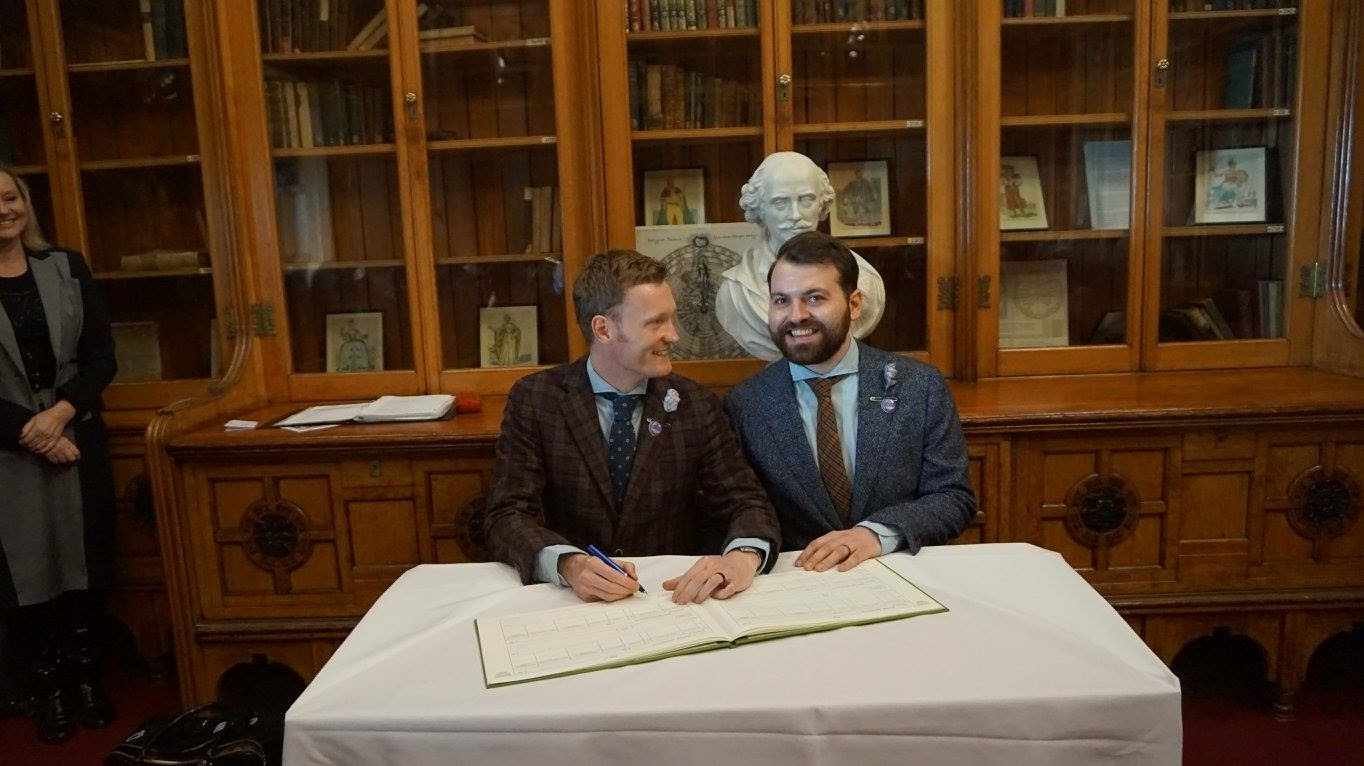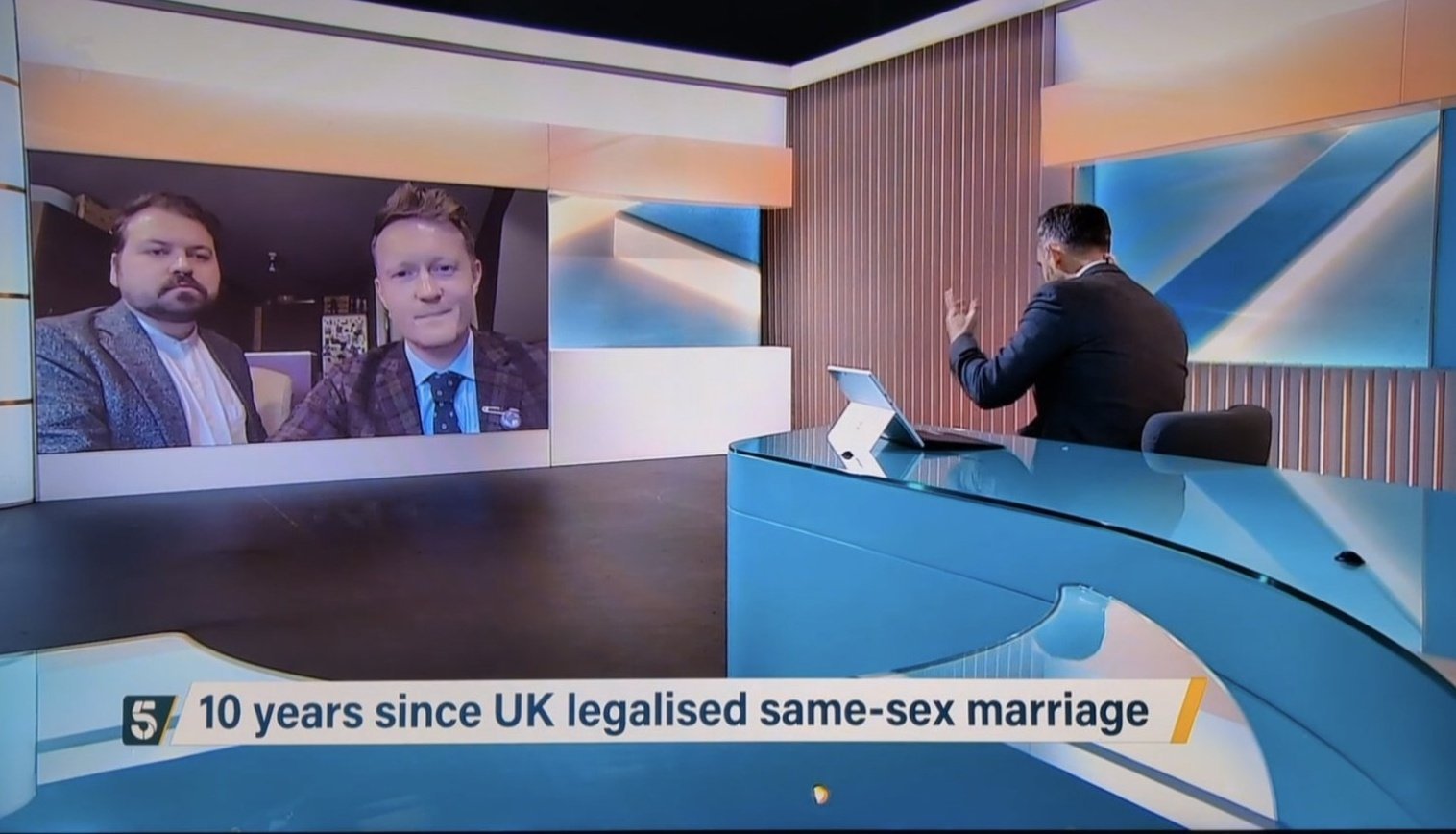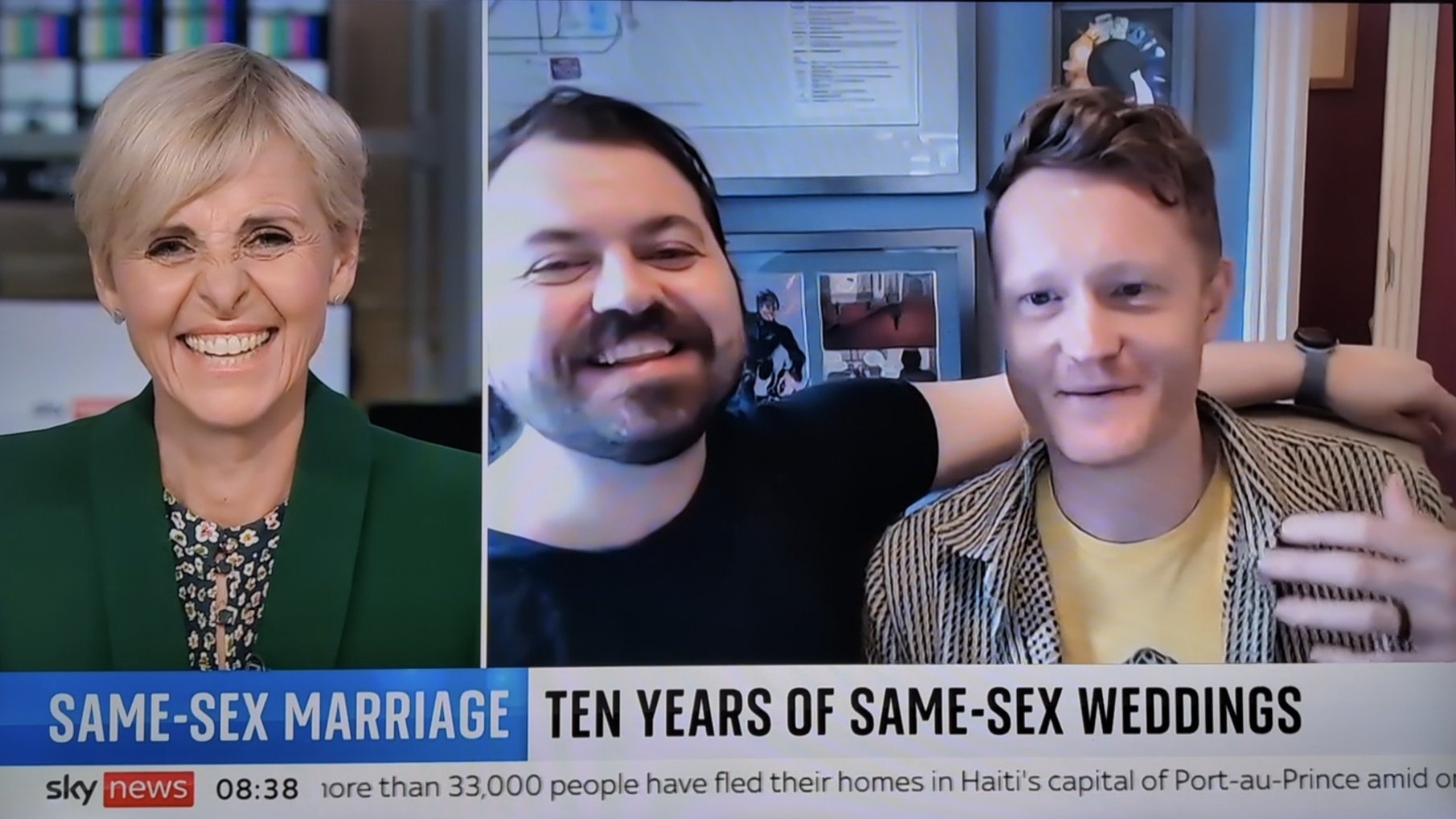This dream is for us: celebrating a decade of same-sex marriage
On 29 March 2014, same-sex marriage became legally possible in England and Wales, something that nine-year-old David could never have fathomed happening back when he was perturbed by watching James Bond get married in You Only Live Twice. Having been happily married for almost the entire last decade himself, why does it still feel like he’s living in a dream?
James Bond will die!
James Bond will marry!
James Bond will become Japanese!
Had 1967’s You Only Live Twice been released several decades later, its publicity campaign would justifiably have been accused of peddling fake news. All of its bold claims - Bond dying, marrying and becoming Japanese - turned out to be ruses. It was all a publicity stunt. In plot terms, death, marriage and switching race were flimsy pretexts for Bond maintaining his cover as a not-so-secret agent, perhaps a meta-commentary on Connery’s inability to escape the role that had made him a star.
When I first saw You Only Live Twice on TV in the early 1990s, I was unaware of the publicity that had attended the film’s release more than three decades previously. For me, it was just like any other Bond film. I mean that in the best possible way: no Bond film is just a Bond film. They’re all special, but even the most ardent fans have to admit that most of them are pretty predictable.
So when Bond died ‘on the job’ at the end of You Only Live Twice’s pre-titles sequence I wasn’t surprised when he sprang back to life minutes later. Of course James Bond can’t die! (NB: This was thirty years before No Time To Die.)
When Bond turned Japanese, I accepted it as just a slightly weird disguise. As a nine-year-old I wasn’t yet versed in academic concepts such as Orientalism, so the ‘problematic’ aspect of the prosthetics passed me by. All I thought was: of course someone can’t change their race! (NB: This was ten years before the DNA-tampering shenanigans of Die Another Day.)
But when James Bond got married, I was more than a little perturbed. What was going on?! James Bond can’t get married! (NB: I had not yet seen On Her Majesty’s Secret Service… although Bond’s marriage is so short lived, it would have hardly have caused me any long-lasting perturbation.)
Whereas it had only taken the duration of the Nancy Sinatra title song to discover how Bond had cheated death in You Only Live Twice, waiting to find out how Bond had cheated matrimony seemed to take a lifetime! When I rewatched the wedding sequence back recently I was surprised that only a few minutes pass between Bond getting betrothed to finding out that the marriage is null and void because Bond gives a fake name at the ceremony. But as a nine-year-old, it seemed to take forever.
If you’ve asked me as a nine-year-old to rank order the likelihood of me:
Dying
Getting married
Turning Japanese
I would have said:
Dying
Turning Japanese
Getting married
And ‘Getting married’ would not just be third but a distant third, waaaaaay down the list. It was a far more remote possibility than turning Japanese.
Asking a nine-year-old to do such a ranking might strike one as a strange thing to do and I would implore anyone considering giving it a go to think again. But, in a very real sense, that’s what we ask children to do all the time. Maybe not the turning Japanese part, but the rest.
We learn about death being inevitable from an early age. Some studies have shown that some children understand this from the age of three. For most children it’s been the ages of five and ten. According to the NHS, “Most children by the age of seven accept that death is inevitable and that all people including themselves will eventually die.”
Many of us learn about the inevitability of marriage much earlier. I didn’t go to a funeral until I was in my late teens, but by that point I’d been to a lot of weddings.
I hated weddings but I understood they were a necessary part of life, like going to the toilet or brushing my teeth. Necessary but boring.
Let’s be honest: most children are bored by weddings. But by the time I saw You Only Live Twice for the first time, I was not just bored of weddings but had actually come to dread them.
By the age of nine I understood I was gay, even if all my thoughts and feelings hadn’t coalesced to the point where I was willing to think of myself as ‘gay’. That would take another seventeen years to happen. But deep down, I knew. I knew I would never have a relationship with a woman. I knew, therefore, I would never be able to get married.
A few years ago, I contributed a chapter to a book about the everyday lives of gay men (funnily enough, entitled The Everyday Lives of Gay Men). I wrote about the recurrent thoughts I have each day, the sort of things that still play on my mind because they were hard-wired into me from an early age. One of these recurrent thoughts is me not quite believing, when I wake up every morning, that I am married. And not just married, but married to a man.
I wrote: “I always said I’d never get married, mostly because I couldn’t picture it happening.” To an extent, this is still the case. There’s still a vestigial part of my brain that won’t let me believe what I can see with my own eyes each morning: a man sleeping opposite me. One day, I may wake up and just accept this new reality without questioning it. But it’s not happened yet.
When same-sex marriage was legalised something did begin to change in my brain. The word ‘marriage’ started to change meaning. But it didn’t happen overnight.
I can’t help thinking of it a bit like this: when my maternal grandmother was in her late-fifties, she suffered a brain hemorrhage. She largely recovered but the language centre of her brain was severely damaged. She never completely relearned language but she got to the point where she could communicate. Curiously, she often spoke in antonyms: ‘husband’ meant ‘wife’, ‘left’ meant ‘right’ and so forth. She became frustrated because she knew exactly what she wanted to say: it sounded correct when it was a thought in her head, but it came out of her lips reversed. Those of us in the immediate family quickly got used to translating, switching words’ meanings around. Some words took on entirely new meanings. We learned these, too. After a few years, we did the translating largely automatically, without having to think too hard about it.
Whenever I hear the word ‘marriage’ today, it still feels a bit like talking with my late grandmother, except now I’m just talking with myself. The earlier meaning - a union between one man and one woman - is still stubbornly hanging on. I know it’s no longer correct, at least in my home country. But just because the meaning has shifted in all major British English dictionaries - a union between two people - doesn’t mean it’s shifted entirely in my brain.
Whenever I hear the word ‘marriage’ today, there’s still a part of me that feels the way I did back when I saw You Only Live Twice as a nine-year-old. This part of me says: what I am seeing James Bond doing on screen is not something that will ever have any relevance to me.
While the mental effort to correct myself gets less and less as time progresses, my brain still has to do a bit of translating whenever I hear the word ‘marriage’. Oh yes, I tell myself, marriage does have meaning for me now. It’s not just an abstract concept, something that applies merely to other people. I am married. I have been since 28th March 2015, on the eve of the one year anniversary of same-sex marriages being possible in England and Wales. A happy coincidence that we picked that day (it coincided with the start of the Easter school holiday).
There are times, particularly when my husband and me are travelling, where I feel the urge to say such things aloud, particularly when we’re travelling to a country where same-sex unions are not legally recognised, such as Japan. We’ve had our fair share of quizzical looks as we’ve checked into hotels as husband and husband (Japanese: otto to otto). Our marriage, which felt rock solid when we were at home, suddenly feels at risk of getting lost in translation. Perhaps I have the urge to speak of my marital status aloud so it takes on more substance.
I didn’t give a false name at the ceremony like Bond did. We have passports, a marriage certificate, a mortgage, three cats… what other proof do you need?
You Only Live Twice was released in 1967, the year homosexuality itself was partially decriminalised in England and Wales. If I’d been born only fifteen years earlier, my existence would have been an offence. Little wonder, then, that we sometimes struggle to comprehend that we really do exist, let alone have the right to get wed.
Nancy Sinatra sings of drifting through the years, living a life that seems tame until love appears. For many queer people, a tame life would have been preferable. Many of us found our early lives terrifying. Love of any kind, let alone a love solemnised with a marriage ceremony, was a strange concept, something that happened to other people.
Are we dreaming? Will we, I can’t help thinking when I wake up most mornings, need to pay a price at some point?
Several people have hypothesised that the appeal of Bond can be attributed to him living the high life, but ultimately paying the price for it (sadistic torture; the omnipresent threat of sudden death). It resonates with our culture’s ideals, rooted in religion: to temper indulgence. The lyrics to You Only Live Twice encapsulate this idea.
Maybe we queers love Bond because we’ve experienced this, but in reverse. We’ve already paid the price. This is our second life.
In other media…
We spoke with Hannah Cottrell of the Press Association and the story was picked up by news outlets. Click the images to read the pieces.







